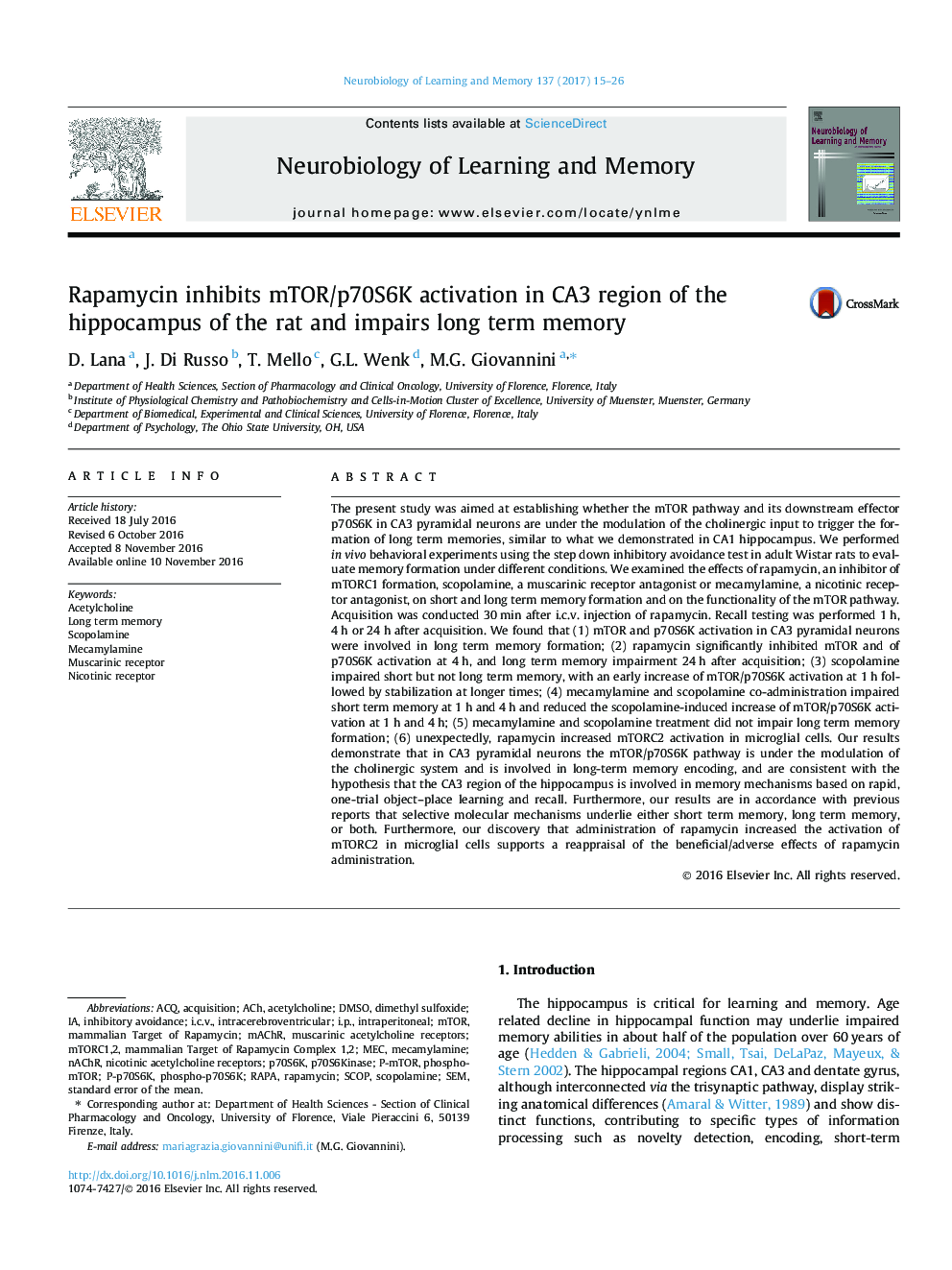| کد مقاله | کد نشریه | سال انتشار | مقاله انگلیسی | نسخه تمام متن |
|---|---|---|---|---|
| 5043368 | 1475137 | 2017 | 12 صفحه PDF | دانلود رایگان |

- mTOR/p70S6K activation in area CA3 are involved in long term memory formation.
- Rapamycin inhibited mTOR/p70S6K activation at 4Â h and impaired long term memory at 24Â h.
- Scopolamine activated mTOR/p70S6K at 1Â h and impaired short but not long term memory.
- Mecamylamine reduced the scopolamine-induced increase of mTOR/p70S6K activation at 1Â h.
- Rapamycin increased mTORC2 activation in microglial cells in Stratum Radiatum.
The present study was aimed at establishing whether the mTOR pathway and its downstream effector p70S6K in CA3 pyramidal neurons are under the modulation of the cholinergic input to trigger the formation of long term memories, similar to what we demonstrated in CA1 hippocampus. We performed in vivo behavioral experiments using the step down inhibitory avoidance test in adult Wistar rats to evaluate memory formation under different conditions. We examined the effects of rapamycin, an inhibitor of mTORC1 formation, scopolamine, a muscarinic receptor antagonist or mecamylamine, a nicotinic receptor antagonist, on short and long term memory formation and on the functionality of the mTOR pathway. Acquisition was conducted 30Â min after i.c.v. injection of rapamycin. Recall testing was performed 1Â h, 4Â h or 24Â h after acquisition. We found that (1) mTOR and p70S6K activation in CA3 pyramidal neurons were involved in long term memory formation; (2) rapamycin significantly inhibited mTOR and of p70S6K activation at 4Â h, and long term memory impairment 24Â h after acquisition; (3) scopolamine impaired short but not long term memory, with an early increase of mTOR/p70S6K activation at 1Â h followed by stabilization at longer times; (4) mecamylamine and scopolamine co-administration impaired short term memory at 1Â h and 4Â h and reduced the scopolamine-induced increase of mTOR/p70S6K activation at 1Â h and 4Â h; (5) mecamylamine and scopolamine treatment did not impair long term memory formation; (6) unexpectedly, rapamycin increased mTORC2 activation in microglial cells. Our results demonstrate that in CA3 pyramidal neurons the mTOR/p70S6K pathway is under the modulation of the cholinergic system and is involved in long-term memory encoding, and are consistent with the hypothesis that the CA3 region of the hippocampus is involved in memory mechanisms based on rapid, one-trial object-place learning and recall. Furthermore, our results are in accordance with previous reports that selective molecular mechanisms underlie either short term memory, long term memory, or both. Furthermore, our discovery that administration of rapamycin increased the activation of mTORC2 in microglial cells supports a reappraisal of the beneficial/adverse effects of rapamycin administration.
Journal: Neurobiology of Learning and Memory - Volume 137, January 2017, Pages 15-26